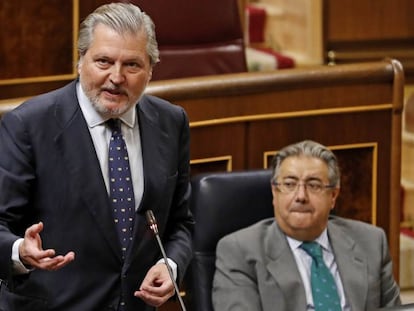Spain’s opposition flexes its muscle in Congress with minimum wage proposals
Prime Minister Rajoy’s minority PP government loses two votes in Parliament in one day
Spanish Prime Minister Mariano Rajoy has been given another reminder of the harsh realities of overseeing a minority government: on Tuesday, his Popular Party (PP) lost a key vote on a bill to raise the minimum wage, which it opposed, while its proposals to overhaul the legal system were rejected by deputies.

The minimum wage proposal, put forward by Unidos Podemos, a coalition between the anti-austerity grouping Podemos and the Communist Party-led United Left, would see the monthly minimum wage rise from €655 a month to €800 from January 1, 2018, with the goal of increasing it to €950 over the next four years. The move represents a key step toward the opposition’s ability to change the PP’s austerity policies through Congress, said Podemos deputy Iñigo Errejón.
The proposal must now go before a parliamentary commission and then be approved by the Senate. Along the way it will likely be amended.
The government tried to overturn the minimum wage proposal
Emerging center-right party Ciudadanos, which supports the PP in Congress, abstained in the vote, and has called for a major reform of the country’s labor laws.
Spain’s minimum wage is applied to a relatively small number of workers, but any increases to it are used as a benchmark in collective bargaining agreements.
The PP’s Congressional spokeswoman, Susana López Ares, said the hike in the minimum wage would spell more inequality and unemployment, costing the Spanish taxpayer €1.3 billion in 2017 and more than €2.5 billion in 2020.
Meanwhile, the PP and Ciudadanos’ proposals to reform the legal system were rejected by the Socialists (PSOE) and Unidos Podemos, along with regional parties and independents.
Spain’s minimum wage is applied to a relatively small number of workers
Among the changes Ciudadanos wants to see to the legal system is an end to any parliamentary involvement in the election of judges to the General Council of the Judiciary (CGPJ), the body that oversees Spain’s legal system.
The government tried to overturn the minimum wage proposal citing an amendment to the Constitution introduced by the Socialists that allows it to veto any bills that would increase the budget. Congress has limited that ability, and the government says it will now put the matter before the Constitutional Court.
The Basque Nationalist Party (PNV) saved the government from further defeat by joining it in opposing a proposition put forward by the Catalan Republic Left (ERC) to lower the voting age to 16, which the Socialists and Podemos support.
The opposition is expected to make further proposals in Congress in the coming months. So far, the Socialists have garnered support among other opposition parties for the government’s education reforms to be halted. But while the opposition is able to agree broadly on key issues, it later disagrees on what specific changes and amendments need to be made to the PP’s policies.
English version by Nick Lyne.
Tu suscripción se está usando en otro dispositivo
¿Quieres añadir otro usuario a tu suscripción?
Si continúas leyendo en este dispositivo, no se podrá leer en el otro.
FlechaTu suscripción se está usando en otro dispositivo y solo puedes acceder a EL PAÍS desde un dispositivo a la vez.
Si quieres compartir tu cuenta, cambia tu suscripción a la modalidad Premium, así podrás añadir otro usuario. Cada uno accederá con su propia cuenta de email, lo que os permitirá personalizar vuestra experiencia en EL PAÍS.
En el caso de no saber quién está usando tu cuenta, te recomendamos cambiar tu contraseña aquí.
Si decides continuar compartiendo tu cuenta, este mensaje se mostrará en tu dispositivo y en el de la otra persona que está usando tu cuenta de forma indefinida, afectando a tu experiencia de lectura. Puedes consultar aquí los términos y condiciones de la suscripción digital.










































